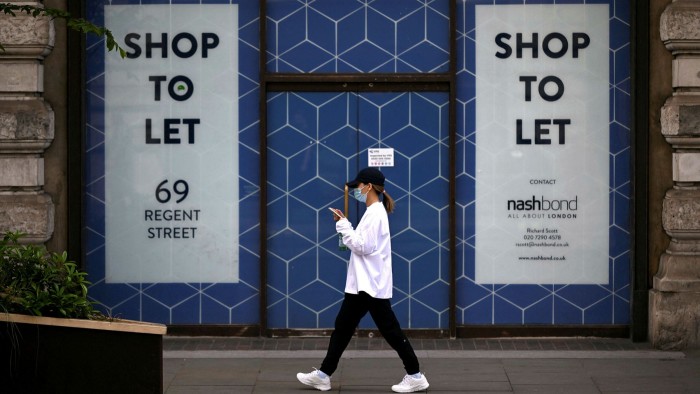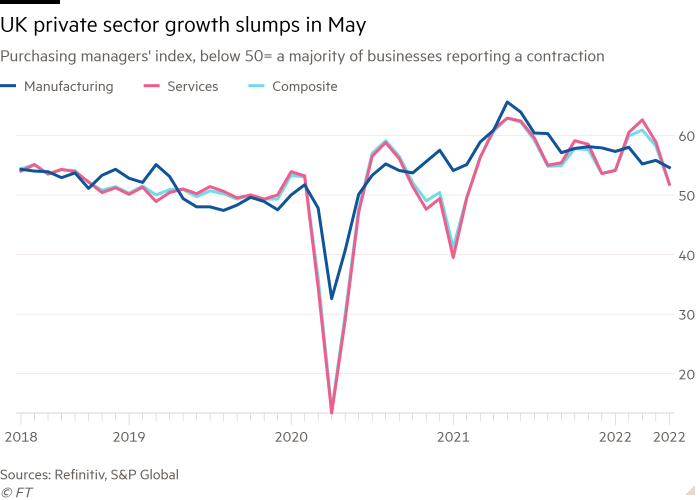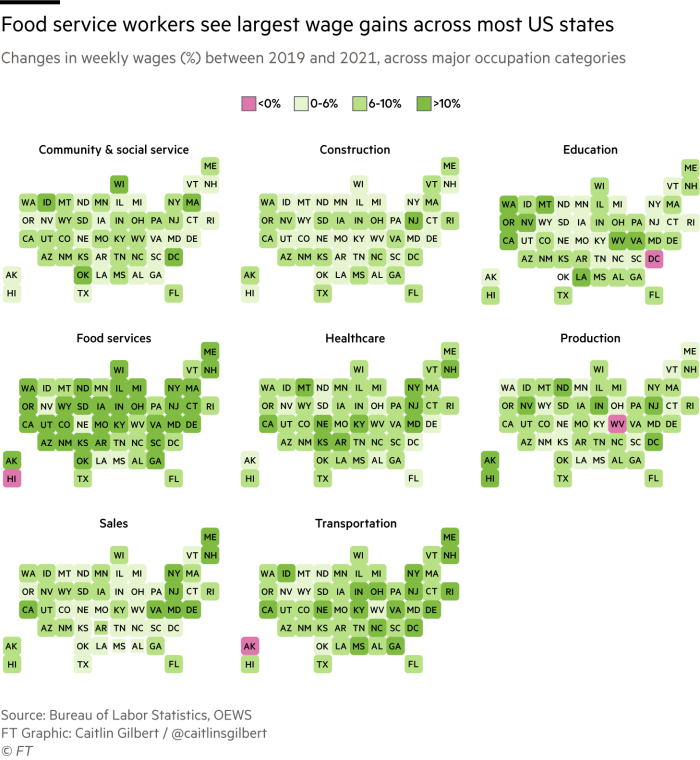UK economic outlook worsens as income inequality rises

Simply sign up to the Global Economy myFT Digest -- delivered directly to your inbox.
This article is an onsite version of our Disrupted Times newsletter. Sign up here to get the newsletter sent straight to your inbox three times a week
Good evening,
Growth in UK manufacturing and services activity has plunged to a 15-month low, fuelling the risk of a recession. Business activity has hit its lowest level since January 2021, when the country was in full lockdown. The UK composite purchasing managers’ index, an indicator of overall economic health, fell sharply to 51.8 in May, down from 58.2 in April.

Chris Williamson, chief business economist at S&P Global Market Intelligence, said the results hinted that “worse is to come”. He added that companies cited an increasingly cautious mood among households and business customers linked to the cost of living crisis, Brexit, rising interest rates, China’s Covid lockdowns and the war in Ukraine.
Despite a tight labour market, UK income inequality is on the rise with pay growing fastest for the highest earners, while those on the lowest incomes are most adversely affected by soaring inflation. Recent payroll data from HM Revenue & Customs, which include bonuses, show that for the top 1 per cent of employees pay rose by more than 7 per cent in real terms between December 2019 and March 2022. For the tenth lowest paid, real terms wage growth was just over 2 per cent.
The acceleration in pay at the top of companies is a sharp reversal of the trend in the years leading up to the pandemic, when earnings were growing fastest for the lowest paid, partly owing to rapid increases in the UK’s minimum wage.
There is also the problem of price increases outstripping salary gains, even in America’s hot labour market where companies are willing to offer more competitive and higher wages. Over the past year, prices for urban consumers in Atlanta, for example, are up 10.8 per cent, more than the 7.9 per cent increase across the country as of April, according to the Bureau of Labor Statistics. The agency’s latest data show that real hourly earnings, adjusted for inflation, are down 2.6 per cent year on year.
“We have this situation where it’s not really worthwhile to participate in the labour market. It’s expensive to go to work, especially if you don’t make a lot and you have to find childcare,” said Nela Richardson, chief economist at payroll processor ADP.

Latest news
Russia simplifies citizenship process for Ukrainian regions of Kherson and Zaporizhzhia
Stocks struggle for direction as traders assess monetary policy direction
G7 explores ways to bypass Odesa to export Ukrainian grain
For up-to-the-minute news updates, visit our live blog
Need to know: the economy
China’s premier has said the world’s second-largest economy could struggle to record positive growth in the current quarter, urging officials to help companies resume production after Covid-19 lockdowns.
The eurozone banking system will remain “resilient” despite disruption in energy and commodity markets caused by Russia’s invasion of Ukraine, the European Central Bank has concluded after carrying out a “vulnerability analysis” of the sector.
Pakistan’s foreign minister Bilawal Bhutto Zardari says he hopes the country can renegotiate a loan with the IMF in response to the surge in global food and fuel prices, as mounting political unrest piles pressure on Prime Minister Shehbaz Sharif’s new government.
Sri Lanka has opened talks with the IMF over a $4bn bailout with observers waiting to see how China, one of the main creditors, will react. This month, the country defaulted on its overseas loans after missing interest payments on two $1.25bn sovereign bonds. This made it the first country in the Asia-Pacific to do so in more than two decades, according to Moody’s data.
Latest for the UK and Europe
EU officials are working on a potential centralised procurement deal for smallpox vaccines to be used against rising numbers of monkeypox infections in Europe, as nations race to secure orders for the relatively limited number of doses available. There were nearly 100 confirmed cases globally as of May 21, according to the World Health Organization.
Many consumers fear being forced into fuel poverty, which is one reason why a UK windfall tax has widespread public support. Shares in some of Britain’s biggest power companies fell sharply yesterday, as chancellor Rishi Sunak drew up plans for a windfall tax on the energy sector to help offset spiralling domestic fuel bills.
UK prime minister Boris Johnson has accepted “full responsibility” for a drinking and lawbreaking culture in Downing Street during the Covid pandemic, after senior civil servant Sue Gray published a scathing verdict on the partygate affair.
Global latest
The head of Pfizer, Albert Bourla, has warned that growing public complacency towards Covid-19 and the continuing politicisation of the pandemic response will cost lives as the world is hit by new waves of the virus in the coming months.
US president Joe Biden made an emotional plea for the country to “stand up to the gun lobby” after an 18-year-old gunman killed at 19 children and two adults in the deadliest school shooting in America for a decade.
Two years ago today, African-American George Floyd was murdered by a white police officer in Minneapolis. Talk of systemic racism still dominates local politics, but efforts to address it have been frustrated by a host of factors, from a divided state legislature to the distractions of the lingering Covid crisis. The anniversary of Floyd’s death comes as police reform has stalled at both the federal and local levels. Today, Biden is expected to issue an executive order aimed at reforming some areas of policing.

Need to know: business
The “subscription economy” is heading into its first serious downturn, writes Helen Thomas. Businesses offering consumers services or products on subscription took off in about 2011, led by TV and music streaming services and quickly followed by beauty products, clothes, organic coffee, craft beer, pet food and much more. Now, this business model is about to be tested.
Hedge funds that use powerful computers to run their portfolios are making huge profits in this year’s market turmoil, marking a resurgence for a sector trying to recover from a long stretch of weak performance. The $337bn industry is now making its biggest gains since the 2008 financial crisis.
Airbnb will close its China business this summer after a years-long push to crack the market was throttled by the effect of Beijing’s harsh zero-Covid strategy on domestic and international tourism.
Amazon shareholders will challenge the company on executive pay, tax transparency, working conditions and unionisation today, as chief executive Andy Jassy faces his first annual meeting at the helm of the ecommerce giant.
Glencore will plead guilty to multiple counts of bribery and market manipulation and pay penalties of up to $1.5bn following US, UK and Brazilian investigations that uncovered corruption at one of the world’s largest commodity traders.
The World of Work
A virtual office in the metaverse is being touted as the future of work, but raises many unanswered questions. One of which is how working in a virtual reality world beyond national and corporate borders might affect both employment rights and our relationships with colleagues. This week’s Working It podcast looks at the practicalities.
Working from a subtropical island sounds like a dream — but don’t get too jealous. Our technology reporter Cristina Criddle not only missed in-person interactions and the separation of home and office, but discovered that working in the sun is impractical — find out why.
Join us at the FT’s Future of Work event, focusing on rethinking the digital workplace, on October 19. Listen to talks on topics such as preparing businesses for a cyber attack and creating a leadership style for the hybrid world. There will be guest speakers from Nasa, the World Economic Forum, LinkedIn, Facebook and the Institute for the Future of Work.
Covid cases and vaccinations
Total global cases: 521.7mn
Total doses given: 11.8bn
Get the latest worldwide picture with our vaccine tracker
And finally . . .
Kylie Minogue has wowed the world with her catchy pop songs. In 2020, she expanded her talents and launched her own wine brand, which will be available in the US from next month. Minogue tells Jessica Beresford why she could not get the idea of having her own rosé out of her head.

Thanks for reading Disrupted Times. If this newsletter has been forwarded to you, please sign up here to receive future issues. And please share your feedback with us at disruptedtimes@ft.com. Thank you
Comments